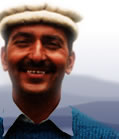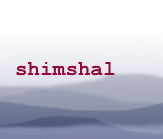Every attempt has been made to gloss all the terms in the testimonies. Most of the words below are Wakhi, a few are Brushaski (language of Hunza) or Urdu (national language of Pakistan).
AKES |
Aga Khan Education Service |
AKRSP |
Aga Khan Rural Support Programme |
Arbitration Committee |
a group of villagers responsible for resolving conflicts |
arbob |
Mirís main representative in the village; when the Mirís
state was abolished the equivalent position became numberdar the
governmentís representative. |
arbobi system |
responsibilities/functions of arbob |
ashar |
unpaid labour for the Mir |
Assalam-o-Aliakum |
Muslim greeting: peace be with you |
bett |
(1) coarse woollen cloth (2) long woollen overcoat (also known as chugha) |
bech |
Uncle |
bhai |
brother |
Bismillah |
in the name of God |
Bismillah Rehman-e-Rahim |
In the name of God the magnificent and the most merciful |
bitan |
shaman; person who can communicate with the mountain spirits, enabling
them to heal the sick or predict the future |
borwar |
(literally, one who carries the load); less wealthy villagers who
carried the Mirís taxes from Shimshal to the Mirís palace in Hunza |
charaman |
round compacted ground used for the threshing of crops by animals |
Chipits |
term for Chinese raiders |
chiqmaq |
flint |
chorbu |
public announcer during the Mirís regime |
chugha |
long woollen overcoat |
clean-up expeditions |
expeditions to remove rubbish and equipment left by previous mountaineering
and trekking groups |
cuk |
water spring |
daulat |
wealth Ė gained by agricultural products and livestock |
deg |
cast iron cooking pot; 100 litre capacity |
dildong ben |
place close to the fire in Wakhi houses |
down country |
refers to the rest of Pakistan |
down valley |
refers to Hunza and Gojal |
duaa |
prayers |
dut |
cable way |
EEP |
Environmental Education Programme |
farman |
instruction/guidance from the Imam of the time |
gharbal |
measurement for food grain: 1 gharbal = approx 13 kg |
ghell |
shelter for goats and sheep |
ilm |
(literally, light); used to mean knowledge/education |
Imam |
hereditary spiritual leader of the Ismaili Muslims, currently Prince
Karim Aga Khan |
Imamat Institutions † |
office of the Imam (Aga Khan) |
Insha-allah |
God willing |
IUCN |
International Union for the Conservation of Nature |
Jamat khana |
religious and community centre of Ismaili Muslims |
jamat |
Ismaili community |
janab |
Mr, sir |
jungle |
forest |
K2 |
highest mountain in Pakistan, second highest in the world (8,611 metres) |
kamdia |
religious leader second to mukhi; assists mukhi in his
work and exercises the same authority in the absence of mukhi |
kanai |
cotton cloth previously used to make womenís shirts |
kerest |
overcoat made from animal hide |
khalifa |
Before the Ismaili constitution the current position of mukhi
was called khalifa. |
kongra |
tower for observing the sun for Shimshal calendar |
kooch
|
migration; especially seasonal migration with livestock to and from
Pamir, the pasture |
| kubri |
embroidery design for womenís caps in the past |
kurmumic |
hide and seek game |
kuryar |
communal labour |
langar |
communal kitchen of Jamat khana |
lopan |
(literally, elders); also refers to those wealthy enough to pay taxes(in kind) to the Mir, and to those representing the Mir in the village |
lubi |
border security personnel |
markhor |
ibex (type of wild mountain goat) |
Matriculati |
secondary school certificate, 10th class |
Maula† |
(literally, master); the Imam (Aga Khan) |
maunds |
measurement: 1 maund = 37.5 kg |
minderich |
type of grass |
Mir |
rulers of Hunza up to 1974 |
Miri system |
Mirís regime |
mukhi |
local religious leader responsible for all religious activities in
Jamat khana Ė a rotational position |
Nanga Parbat |
second highest mountain in Pakistan, ninth highest in the world (8,125
metres) |
nikah |
Islamic matrimonial agreement |
nomus†
|
The tradition of nomus refers to the system by which households
or individuals with sufficient resources sponsor a community development
project, for example, the construction of a track, bridge or community
building. The project is carried out in the name of a relative. The sponsorship
is in the form of resources for the project and/or food for the community
members who will voluntarily carry out the construction. The particular
track, bridge or building etc is always referred to by the name of the
person in whose name it was sponsored and by Ďthe personí who actually
sponsored it.
(Namus is an Arabic word meaning reputation, fame, honour. In
Shimshal this is what you get for philanthropic contributions for community
work, hence doing such work is known as nomus.) |
nullah |
gorge |
numayindar |
village representative to the local government |
numberdar |
government representative in the village elected by the community.
He is elected for life or until the community is no longer satisfied with
his performance. |
palos |
local woven carpet made of yak or goat hair |
Pamir |
Shimshalís mountain pastures |
pardes |
a foreign/strange place(s); outside the area |
pathok |
offering; wheat flour thrown at the entrance of a house as a gesture of good luck |
patto |
coarse woollen cloth (also referred to as bett) |
peel |
wooden plate |
Pehlawan |
hunter |
pirhan |
womenís long shirt or dress |
pishmoh
|
local game involving two teams making mounds of earth and then attacking
each otherís mounds |
poosteen |
overcoat made of animal hide |
qabil |
(literally, competent): title for the most competent woman or man
in Shimshal |
qalami |
printed cloth |
qazi |
religious literate responsible for religious performances on weddings;
he would recite nikah and read words from the Quran chosen for
weddings Ė this position no longer exists. |
qeech |
local medicinal plant |
Quran |
Islamic holy book |
raghz |
long woollen shirts |
rizen |
opening in centre of the roof of a Wakhi/Tajik house, for ventilation |
room |
main lineage groups/clans. In Shimshal these are: Boqi Kathor, Ghazi
Khathor and Bakhti Kathor |
rupees |
currency |
sadar |
president |
saghoo |
cylindrical wooden instrument used for extracting butter: long round
shaped pot about four feet long with a long stick with a big wooden ball
at its end |
sahib |
Sir, term of respect |
salam |
greetings; respect (shortened version of Assalam-o-Aliakum) |
sandal |
long shoes made of animal skin with a thick leather sole |
shaff |
local grass, used for washing cloths |
shakhore |
ash made from local plant used as shampoo |
shalwar-qameez |
traditional trouser and shirt for men and women |
sharma |
local woven carpet made of yak or goat hair (Brushaski for palos) |
shartwurza |
(literally, promised guest) two men from the village who visit Pamir
to grace the Chaneer festival, and bring back butter for the villagers
|
shogoon |
festivals; purifying |
Shogoonpathok |
person designated to inaugurate festivals, hereditary position |
shpun |
herder; usually used to refer to those who spend winter in the pastures
taking care of the yaks |
shpunig |
herding |
shushk |
long shoes made of animal hide without a thick leather sole |
| skuin ††† |
extended family group, sub-group of room |
SNT |
Shimshal Nature Trust |
subidar |
military rank; sergeant |
sufra |
(literally, gifts), refers to some of the taxes paid by Shimshalis
to the Mir |
taghar |
sack made from goat hair to store wheat |
Tariqa |
(literally, the way/ the procedure), refers to religious education |
tawiz |
amulet; traditional spiritual treatment for disease |
thrangpa† |
representative of the Mir who visited Shimshal once a year to monitor
tax collection |
toman |
smoke from burning juniper branches used to purify homes at the beginning
of the Tagam festival |
trophy hunter |
a hunter who pays the community to hunt for a large game animal |
tuksori |
game similar to cricket; known as gully danda in Urdu |
ustad † |
teacher; master |
vandan † |
enclosure where shepherds take their yaks for milking whilst in Pamir |
wotokh |
special tax paid in lieu of special privilege (like a job or position)
granted by the Mir |
WWF |
World Wildlife Fund |
yarapgi |
responsibilities/functions of yarpa |
yarpa † |
Mirís representative responsible for livestock production and supervision
of central grain store |
yeelban † |
taxes paid to the Mir |
yeer har yupk |
(literally, sun light falling on the water); when sunlight covers the village after 40 days of shade |
yorch |
place for dancing in Wakhi/Tajik houses |
yurt |
the villagers, the community |
yupk |
water |
zamindari |
farming |
Chaneer |
harvest festival celebrated in the first week
of August when the wheat and barley is almost ready |
Charaman Katak |
festival inaugurating the threshing field |
Chiragh |
(literally, light); religious event performed on the third
day after death |
Hoshigarm |
hot soup festival celebrated in February to mark the end
of winter, when the sun’s rays hit the village for the
first time after 40 days |
Kethedith |
Spring festival celebrated in March when the frozen land
has melted; people clean their houses and take the fertiliser
from the livestock sheds to the fields. |
Kooch festival |
festival which takes place at the start of migration to
Pamir and, most enthusiastically, when people return months
later with many livestock products |
Mehmani |
special meal for guests (associated with marriage ceremony) |
Mirgichig |
purification custom which inaugurates the milking season
on arrival at the pastures. Butter and cheese is produced
with great care and is given as zakat (a religious
tax) with a special prayer. |
Nauroz |
New year festival celebrated on 21 March throughout Central
Asia |
Pergvendak |
necklace-tying ceremony; this is the formal engagement
held three days before the wedding when the necklace is put
on the bride and a cap placed on the groom’s head. |
Safza Sar |
(literally, green head); refers to crop sprouting festival
|
Salgirah |
Ismaili celebration on the 11th of July – the day
that Prince Karim Aga Khan, 49th Imam of the Ismailis, took
over from his grandfather Sir Sultan Mohammad Shah |
Shegd-pagash-diyetk |
custom of tasting the new crop |
Shegd Saal |
Wakhi for Nauroz |
Shegd-tar-charaman |
festival celebrating the moment when the new crop is taken
to the threshing place |
Tagam |
sowing festival |
Tarkhun yundak |
invitation to a banquet; first invitation for bride to
visit her parent’s house after marriage |
Vichhosh |
outdoor soup festival (also known as Hoshigarm) |
Wulyo |
the day after the shartwurza (guests of the year)
arrive in Pamir there is a riding excursion to Wulyo. All
the men at Pamir ride yaks to reach Wulyo and the newborn
baby boys are also taken to this place. Lunch is prepared
and different local games like tug of war are played. Shartwurza
are the chief guests for these celebrations. |


